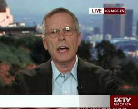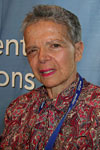UCLA's Politicized Middle East Studies Professors
By Cinnamon Stillwell
FrontPageMagazine.com
Tuesday, November 13, 2007
Earlier this year, the Center for Near Eastern Studies at the University of California, Los Angeles celebrated its fiftieth anniversary. It was founded in 1957 by Gustave E. Von Grunebaum, a scholar at the University of Chicago’s Oriental Institute and the first president of the Middle East Studies Association. Grunebaum sought to establish at UCLA a groundbreaking Middle East and Islamic Studies program featuring an array of experts in languages, culture, and history.
Unfortunately, the best-known UCLA professors specializing in the region today, far from embodying the classical approach to the discipline in which knowledge is the overriding goal, exemplify the highly politicized world of modern Middle East studies. Ignoring the vast majority of the region and myriad pressing issues, including terrorism, the need for religious reform, women's rights, resistance to modernity, and the prevalence of tyranny, this cadre of Middle East studies professors is fixated instead on post-colonialism, the Arab/Israeli conflict, U.S. foreign policy, and shielding themselves from outside criticism. As pointed out by journalist Rachel Neuwirth, what passes for education at UCLA's Center for Near Eastern studies is, all too often, "sustained academic indoctrination."
[Gabriel Piterberg’s case]
No professor better exemplifies this politicized approach than historian Gabriel Piterberg. […] Apparently, equal opportunity for female terrorists is a pressing "feminist" issue these days. If these are the sorts of associations Sondra Hale and UCLA's Center for Near Eastern Studies are cultivating, a panelist celebrating Osama bin Laden isn’t far off.
[Saree Makdisi’s case]
Next we come to Saree Makdisi, a UCLA professor of English with a focus, as described in his bio, on "British literature and imperial culture." But it's his interest in "the cultural politics of the contemporary Arab world" that has proven to be problematic.
In another example of Ivory Tower-driven paranoia, Makdisi declared in the Seattle Post Intelligencer earlier this month that "academic freedom [is] at risk on campus" […] It seems that academic freedom is a one-way street for self-described "champions of freedom" such as Makdisi – and a dead-end one at that.
[James Gelvin’s case]
UCLA Near East history professor James Gelvin, another signatory to the 2002 University of California divestment petition directed at Israel, presents challenges of his own. His students have taken note, describing him, in one case, as "more of an advocate for the Palestinian cause" than a historian.
In response to rising criticism, especially that perceived as emanating from Campus Watch, Gelvin told the Daily Bruin, "What really irks those guys is that I don’t use my classroom for political purposes, and thus my lectures don’t advance their political agenda." Would that Gelvin’s claim were true, for it is certainly not the agenda of Campus Watch to further the politicization of the field of Middle East studies, but, rather, the opposite.
Gelvin implies that U.S. foreign policy was to blame for the Sept. 11, 2001 terrorist attacks and, in a larger sense, the rise of Islamism. Accordingly, in a course titled, "The History of the Near and Middle East," Gelvin assigns students the book, Islam in Transition: Muslim Perspectives, which is co- edited by Georgetown Islamic studies professor John Esposito. Esposito is a celebrated recipient of Saudi financial largesse at Georgetown University and, perhaps not coincidentally, one of the prime apologists for Islamism in the field of Middle East studies. One reading assignment from the book is Sayyid Muhammad Husaid Fadlallah's, "We Must Think Before We Act; September 11 Was a Gift to the U.S. Administration," whose title alone suggests a decidedly subjective view of the matter.
Similarly, Gelvin's subtitle under a discussion section on the war on terrorism for the same course is, "The Mess That We’re In." To be fair, Gelvin's course readings include offerings from all sides of the political spectrum, not to mention the oft-ignored words of al- Qaeda leaders, but one wonders in what context it's being presented?
Gelvin's role as the organizer of a conference to be held at UCLA's Center for Near Eastern Studies this month titled, "Jihadi Islam Conference/Workshop," would seem to answer this question. While the conference's subject matter is laudable, especially in light of the dearth of attention paid to terrorism in the field of Middle East studies, its conclusions may prove debatable. According to Gelvin's description, the conference seeks to "propose alternative approaches" to the "underlying assumption of Islamic or Middle Eastern exceptionalism." Appearing on a panel alongside UC Irvine professor Mark LeVine, whose own forays into delusion are well-known (he once declared, "It is time for the United States to declare a truce with the Muslim world, and radical Islam in particular,") Gelvin will provide what he calls "A Historian’s Reply to Terrorology." Applying the lessons of history to the present is praiseworthy, but doing so while ignoring the specific nature of today's threats is little more than willful blindness.
Between the politicized polemics, the blatant biases, and the naïve approach to foreign policy proffered by UCLA's Middle East studies professors, there is certainly room for improvement at the Center for Near Eastern studies.
This is isn't to say that no professors are rising to the occasion, but those in the public eye are conveying a consistently biased impression that is fostering distrust in Middle East studies at UCLA. One might question whether the Center for Near Eastern studies' fiftieth anniversary is a cause for celebration, or an opportunity to reexamine its future course.
One thing's for sure, Gustave Von Grunebaum must be turning in his grave.







